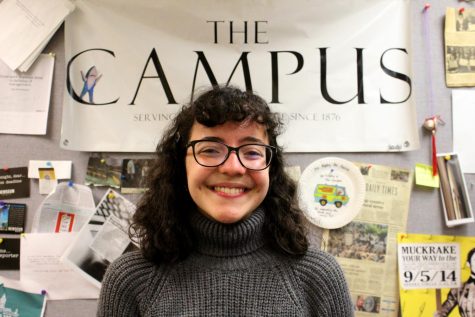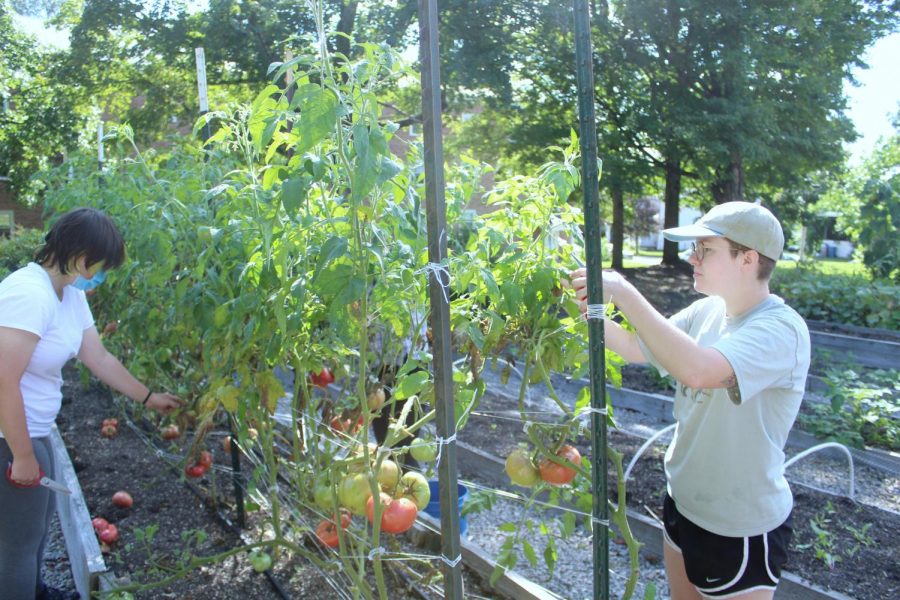Carr Hall Garden welcomes back volunteers
Directly outside of Carr Hall is an expansive garden, known around campus as the “Carrden.” Boasting produce such as kiwi, tomatoes and eggplant, the Carrden does not limit itself in what it grows. There is a greenhouse in the middle of the space for those items — like the aforementioned eggplant — that require a little extra care. Two tables underneath the shade of two grand trees provide a couple of nice spots to observe it all.
A walk through the garden shows that there are many on campus with a flair for the green. A lot of hands have a part in planting and maintaining and ultimately harvesting these crops.
What connects the garden to the students is explained on a sign at its entrance, so it is impossible to view the garden closely without becoming acquainted with its importance. The harvest is sold to Parkhurst, the campus dining service preparing food both at Brooks Dining Hall and at McKinley’s Food Court. 10 to 50 pounds of produce can be sent to the dining halls each week. Oftentimes it is indicated on the menu that what is being served, whether it be a vegetable side dish or ground cherries from the salad bar, comes from right next to Carr H
all.
The profits from the garden are put back into it for the purchase of equipment, seeds and labor. Leftover food scraps are composted, whereupon they become nutrients for the next crops. The process is full circle.
Kerstin Ams is the general manager of the Carrden and teaches in the Environmental Science department at Allegheny.
“(The Carrden) is a way to demonstrate sustainable methods and practices,” Ams said. “Our students can practice and try sustainable agriculture in addition to learning about it in the classroom.”
This fall, students are being chosen at random to receive five or six types of produce, along with a recipe to incorporate said produce. This was announced on a Carrden Instagram post made Aug. 27. For these students, the Carrden is becoming more intertwined with their food than ever, especially considering the fact that they have never been able to eat Carrden produce outside of the dining halls. Students need only fill out a Google Form to enter for a chance to win free Carrden vegetables that week.
Aside from this new vegetable lottery, chickens and two beehives have been introduced into the mix this year so that students can experience that side of agriculture. Ames explained that these new additions have allowed those working with the Carrden to offer more kinds of produce.
According to student volunteer Kate Sosville, ’23, There are even plans to expand the Carrden to create a “food forest” in front of the space.
“We would probably have a lot more fruit trees and a more permaculture-type system,” Sosville said.
Sosville feels as though students studying in the Environmental Science and Sustainability department are initially more curious about this volunteer opportunity than others, but students outside the department have been showing up to volunteer as well.
“I’m glad that our school is able to broaden the group of people that are interested in sustainability methods,” Sosville said.
According to Sosville, there have not been these volunteer opportunities at the Carrden for a while — a complication created by the coronavirus pandemic. While a small-scale agriculture class offered at Allegheny (ENVSC-240) has had students working in the garden, out-of-class volunteering is being brought back after a hiatus through weekly volunteer sessions. Weeding, harvesting, and other maintenance jobs can be taken up by anyone — regardless of experience — who would like to lend a hand to the garden-to-table movement on campus.
“I hope people spread the word that it’s an opportunity for people to spend time outside and get to know people outside their majors or outside their dorms,” Ams said.
Even students who do not volunteer their time at the Carrden are oftentimes familiar with the role it plays on campus. Julia Imler, ’23, currently lives in an apartment. She explained that more often than not she eats at her apartment, but when she has had meals on campus she has seen the produce in the food.
“I feel like the produce gets used a lot at Brooks,” Imler said.
Imler said that this is the first year where she has gotten an opportunity to really walk around the Carrden.
“Visually, it’s a beautiful part of campus, but also I like the purpose that it’s there for,” Imler said.
According to Ames, every hand helps. She wants as many people to share in this bonding experience as possible.
“It’s nice to bond over doing something together, and then you get some fresh produce at the end,” Ames said.
Those who want to share in this purpose need only show up to the garden within the aforementioned timeframe this fall. The volunteer sessions are being held on Mondays between 3 to 5 p.m. through late October.

Sofia Hassan is a second-year student from New Castle, Pennsylvania. She plans to major in English Creative Writing and minor in Middle East and North...

Sami Mirza is a senior from many different places. He is majoring in International Studies with a focus on the Middle East and North Africa and minor in...









